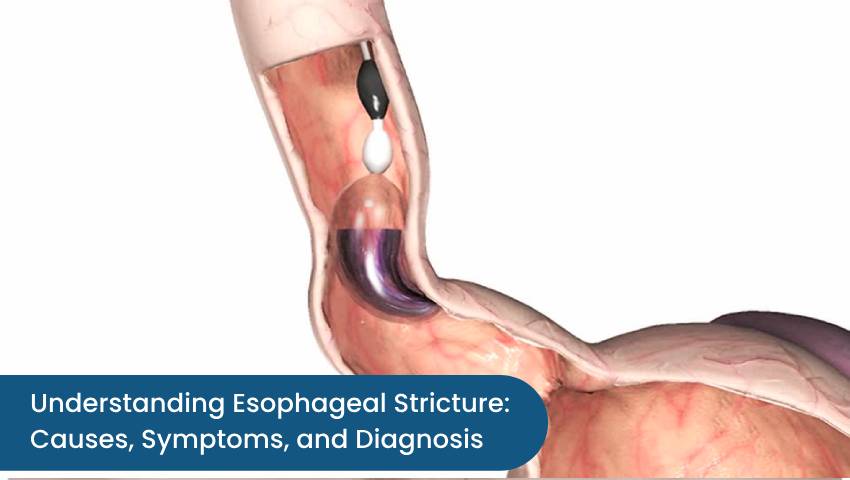
- 05/08/2024
- Kaizen Gastro Care
- 0 Comments
- Digestive Disorder
Understanding Esophageal Stricture: Causes, Symptoms, and Diagnosis
Esophageal stricture, a narrowing of the esophagus, can significantly impact an individual’s quality of life. At Kaizen Gastro Care Clinic, Dr. Samrat Jankar and his team are dedicated to providing expert care for various gastrointestinal disorders, including esophageal strictures. This blog strives to help you understand the causes, symptoms, and diagnosis of esophageal strictures, enabling you to make informed decisions about your health.
Dr. Samrat Jankar is a leading surgical gastroenterologist in Pune at Kaizen Gastro Care Clinic, specializing in the diagnosis and treatment of gastrointestinal disorders. With extensive experience and a patient-centered approach, Dr. Jankar is committed to improving the health and well-being of his patients.
What is Esophageal Stricture?
An esophageal stricture is a narrowing of the esophagus, the tube that carries food and liquids from your mouth to your stomach. This narrowing can lead to swallowing difficulties, making it a concerning situation that needs medical attention.
What Causes of Esophageal Stricture?
Several aspects can contribute to the development of an esophageal stricture, including:
- Gastroesophageal Reflux Disease (GERD): Chronic acid reflux can damage the lining of the esophagus, leading to scarring and narrowing.
- Esophagitis: Inflammation of the esophagus due to infections, medications, or allergies can cause strictures.
- Radiation Therapy: Treatment for cancers in the chest area can occasionally result in esophageal stricture.
- Ingestion of Caustic Substances: Swallowing harmful chemicals or substances can harm the esophagus and cause strictures.
- Esophageal Surgery or Procedures: Surgical interventions or medical techniques involving the esophagus may result in scarring and narrowing.
- Barrett’s Esophagus: A condition where the lining of the esophagus varies due to long-term acid exposure, improving the risk of strictures.
- Esophageal Cancer: Tumors in the esophagus can lead to narrowing as they grow.
What Are The Symptoms of Esophageal Stricture?
The symptoms of esophageal stricture can differ depending on the severity of the narrowing. Common symptoms include:
- Difficulty Swallowing (Dysphagia): A sensation of food getting stuck in the throat or chest.
- Painful Swallowing (Odynophagia): Experiencing pain when swallowing food or liquids.
- Regurgitation of Food: Food coming back up into the mouth after swallowing.
- Heartburn: Ongoing acid reflux and heartburn are common symptoms associated with strictures caused by GERD.
- Chest Pain: Some people may experience chest pain or discomfort, mainly when swallowing.
- Unintended Weight Loss: Difficulty in eating can lead to weight loss and malnutrition.
- Chronic Cough or Sore Throat: Continuous irritation can result in a cough or sore throat.
How To Diagnose Esophageal Stricture?
Accurate diagnosis is crucial for effective treatment. At Kaizen Gastro Care Clinic, Dr. Samrat Jankar uses state-of-the-art diagnostic techniques to identify esophageal strictures:
- Medical History and Physical Examination: A thorough review of the patient’s medical history and symptoms helps identify possible causes of the stricture.
- Endoscopy: A flexible tube with a camera is inserted into the esophagus to imagine the stricture and assess its severity.
- Barium Swallow: The patient swallows a barium solution, which coats the esophagus and allows for detailed X-ray imaging.
- Esophageal Manometry: This test measures the pressure inside the esophagus to evaluate its function.
- Biopsy: A small tissue sample may be taken during an endoscopy to check for any underlying conditions or infections.
- CT Scan or MRI: These imaging tests may be used to evaluate the extent of the stricture and its impact on surrounding structures.
What Are The Treatment Options For Esophageal Stricture?
Once diagnosed, the treatment for esophageal stricture aims to reduce symptoms and prevent recurrence. Treatment options may include:
- Dilation: A method to stretch and widen the esophagus using special instruments.
- Medications: To control underlying conditions such as GERD or infections.
- Dietary Changes: Adopting a soft diet to ease swallowing and reduce irritation.
- Surgery: In severe cases, surgical intervention may be needed to remove the stricture.
Conclusion:
Understanding the causes, symptoms, and diagnostic methods for esophageal strictures is required for effective management and treatment. At Kaizen Gastro Care Clinic, Dr. Samrat Jankar, the best esophageal disorder specialist in Pune is dedicated to providing personalized care and advanced treatment options to help patients achieve optimal health and well-being.
If you or a loved one are experiencing symptoms of esophageal stricture, don’t hesitate to book an appointment with Kaizen Gastro Care, the best gastroenterology clinic in Pune, Maharashtra, for a consultation. Early diagnosis and intervention can make a significant difference in improving your quality of life.
